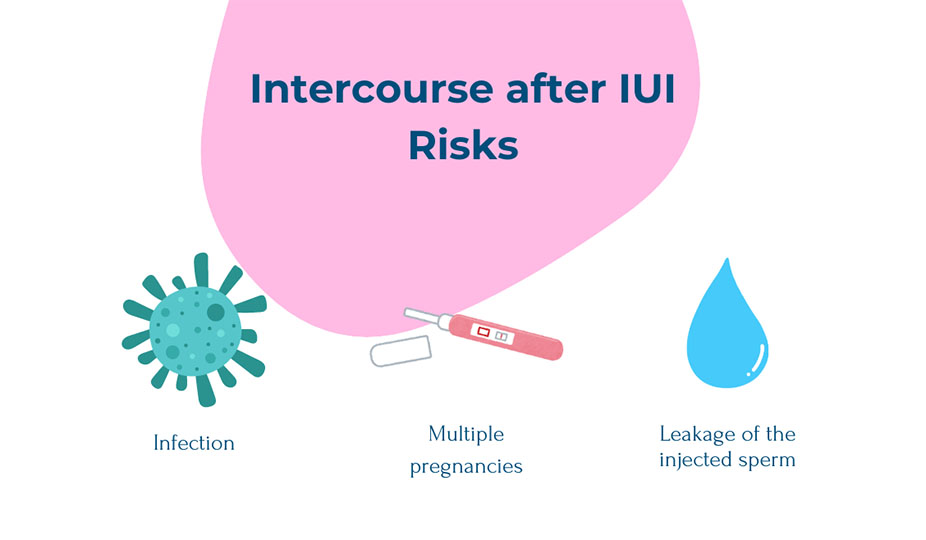Sex after IVF – Can You Have Sex during IVF and a Positive Pregnancy Test
Sex after IVF is a rather sensitive topic that worries many couples preparing for fertility treatment. The main concern is that it can harm the fetus, cause hormonal complications, or even affect the success of the program.

In this article, we will explore the topic of sex during IVF, find out how it affects the results of therapy, and dispel myths about this topic.
Key Concerns about Sex in Different IVF Phases
The IVF procedure begins long before the embryo is transferred to the uterus. It involves hormonal stimulation for egg retrieval and can last for a considerable time. In a long protocol, the program may be up to 2-4 months. All this time, many couples have been in doubt about whether sex will harm the normal course of the program. Here are some of the main concerns that women have about the topic:
- bacterial infections that are undesirable in an IVF cycle;
- orgasm disrupts the hormonal cycle;
- sex after a positive pregnancy test is strictly prohibited.
We are quick to reassure you: these statements are myths. However, some restrictions do exist. Let’s look at them in more detail for each phase.
Is It Normal to Have Sex before IVF?
Before starting the program, a woman undergoes a thorough examination. It allows us to maximize the chances of a successful conception and select an effective set of drugs. Examination measures include blood tests, ultrasound, hormonal analysis, etc. Sexual activity does not affect the result of the screening, which is why there are no restrictions.
However, your doctor may prescribe antibiotic treatment if the examination reveals any diseases or complications. In this case, we recommend avoiding unprotected intercourse and using a condom until the follow-up tests.
Sex during IVF Stimulation
When the examination and selection of a personalized protocol are completed, the stimulation phase begins. During this period, a woman receives injections with hormones that promote the development of an increased number of follicles in the ovaries. It is necessary to obtain healthy eggs. Until about the 6th day of stimulation (respectively, the 8th-9th day of the menstrual cycle), most patients do not feel any significant changes in their health. Gentle sexual intercourse during this period is still possible if a woman does not feel discomfort.
However, there are a few nuances here:
- The fact is that during stimulation, the ovaries begin to increase in size. If at first, it is not noticeable for a woman’s life, later the mechanical effect on the stimulated ovaries will become unpleasant and even dangerous. In addition, in pathological conditions, such as ovarian hyperstimulation, sex is strictly prohibited until the situation is normalized to avoid damage and rupture of the ovaries.
- The second case concerns an unplanned pregnancy. On the background of hormonal stimulation, a woman may experience premature ovulation. In this case, unprotected acts during stimulation may cause multiple pregnancies. To prevent it, you should use a condom during the phase.
If you experience pain during sexual intercourse during hormonal stimulation, contact your doctor immediately to prevent complications.
Sex before IVF Transfer
Before the embryo transfer, the couple must undergo two more procedures: an ovarian puncture to retrieve eggs from the woman and sperm retrieval from the man. Let’s look at both cases.
- Egg retrieval involves puncturing the ovary through the vaginal wall. It is essentially a minimal but surgical intervention. It causes discomfort, abdominal pain, and even dizziness. On this day and until the wound heals, it is better to refrain from intimacy to avoid making the woman feel unwell.
- As for male ejaculation, we recommend that men abstain from it at least 2 days before egg retrieval. It allows us to obtain high-quality sperm samples for successful fertilization.
After successful egg retrieval, the couple may be active up to the night before the transfer. At this time, the ovaries are already returning to normal size, so there are no restrictions on intercourse.
Is Sex after IVF Transfer Safe?
The final stage is the transfer of the embryo. After the procedure, we advise you to avoid sexual activity for 2-3 weeks.
Although the effect of sexual intercourse on the success of the transfer is uncertain, some doctors suggest that it negatively affects the embryo’s attachment to the uterine wall. The fact is that female orgasm causes rapid uterine contractions. It may become an obstacle to the proper implantation.
Once the pregnancy is confirmed, couples return to their normal life. So, sex after IVF positive pregnancy test is completely safe and cannot be contraindicated.
Can You Have Sex during IVF?
Sexual activity before, during, and after IVF is possible. However, it has taboo periods. We have compiled a summary table that will help you navigate sexual activity during a certain period of the cycle.
| Phase | Duration | Possibility of Having Sex |
| Preparation and Health Check-Up | 2-4 weeks | Allowed. It is generally safe to have sex during this phase. |
| Ovarian Stimulation | 10-14 days | Not recommended. Sexual activity often causes discomfort or complications due to enlarged ovaries. |
| Egg Retrieval | 1 day | Not allowed. Avoid it after egg retrieval to prevent infection or injury. |
| Fertilization | 3-6 days | Allowed. However, it may be uncomfortable due to the recent procedure. |
| Embryo Transfer | 1 day | Not recommended. Avoid for at least a few days post-transfer to allow the embryo to implant. |
| Luteal Phase Support | 2 weeks until the pregnancy | Not recommended. To maximize the chances of implantation, it’s often advised to avoid it. |
| After a Positive Pregnancy Test | Throughout pregnancy | Consult your doctor. Depending on your condition, it may be allowed, but in some cases, it might be advised against to avoid complications. |
Please note that each case is individual, and therefore each woman reacts differently to the course of IVF. Consult with your fertility specialist to find out exactly what is allowed and prohibited during the program.
Intercourse after IUI
Intrauterine insemination or IUI is a procedure in which sperm is injected artificially into the uterus, cervix, or fallopian tubes. It is not equal to IVF, because here fertilization occurs in the woman’s body.
As for sex, the views of doctors are radically different. After 48 hours, patients can have sex. In addition, there is an opinion that activity is not only allowed but also recommended to increase the likelihood of getting pregnant. The fact is that intercourse can dilate the cervix and improve blood flow to the pelvis. Thus, there are more chances for a successful pregnancy.
However, intercourse after IUI also has a few warnings:

- The first concern is associated with the risk of infection. Thus, sexual intercourse after insemination can disrupt the ecology of the uterus and lead to infectious diseases that are undesirable in pregnancy. To prevent infection, we advise you to abstain from sex for 2 days. In addition, even after 48 hours, you should use a condom.
- The next risk is multiple pregnancies. If you have taken fertility drugs before insemination, unprotected intercourse might lead to multiple pregnancies. In this case, condom-protected sex is the best solution.
- Lastly, in rare cases, intercourse can cause leakage of the injected sperm. It reduces the chances of successful fertilization. However, by following the advice of a fertility specialist and keeping on bed rest for the first day following the procedure, you prevent this problem.
FAQ
Although there are no reliable studies, some doctors recommend refraining from activity until successful implantation. If you have had intercourse and feel uncomfortable, contact your fertility doctor to rule out any pathologies.
We recommend starting sexual activity 2 weeks following the transfer. If you do not have any complications, you may be sexually active during pregnancy.
If your pregnancy is already confirmed, and you have the “go-ahead” from your doctor, you can have an orgasm.
Female orgasm is a contraction of the uterus. According to many doctors, it negatively affects the implantation into the uterine wall. That is why we recommend that you refrain from masturbation for two weeks.
Final Thoughts
In conclusion, sex after IVF is possible and is not a contraindication. It does not negatively affect the development of the fetus and the woman’s well-being. However, there are times when you should abstain from sexual activity to prevent complications and ensure a smooth cycle. It should also be remembered that each organism reacts to the program in its own way, so the best solution is to consult a specialist before engaging in sexual activity.
If you have any questions about IVF or are preparing for the program, don’t hesitate to contact us for a consultation. Our specialists will conduct a thorough examination and be by your side during all stages.